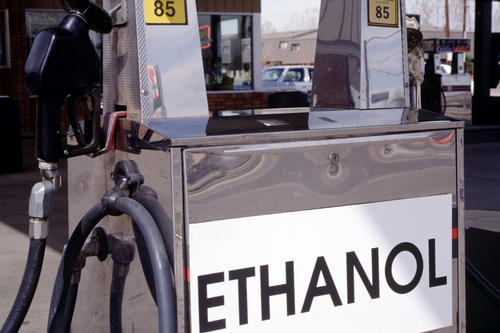Ethanol
Another
alternative fuel that is in development is Ethanol. Ethanol is liquid
alcohol that is produced from grain and agricultural waste. Ethanol is
a colorless liquid, with a pleasent smelling odor. It has a high oxygen
content, and therefore when added to gasoline helps purify the
emissions. Ethanol like the other alternative fuels we have been
looking is available in blends. All major automobile manufatorers
approve the use of E10 (10% ethanol) blends. More recently cars are
being developed that can use blends up to E85. Most of these newer
models accept any other blends as well, making them known as flexible
fuel vehicles (FFV).
There are many benefits to using ethanol as an alternative fuel. Ethanol is much more energy efficent than normal gasoline is. Ethanol has an energy balance of 125% whereas gasoline's is only 85%. Since Ethanol has such a high oxygen content it reduces air pollution, also a benfit of Ethanol is that is has a relatively low reactivity rate meaning that it will not react with many of the atmospheric gases. Although it is not widely used right now as a pure alternative fuel, it has many benefits as a replacement octane enhancer in normal gasoline. It can safely replace methyl tertiary-butyl ether (MTBE) which is the current octane enhancer in gasoline.
Some of the disadvantages to using Ethanol as an alternative fuel is that the prices are fairly high, they are about the same as that of mid-grade gasoline prices. Vehicles that use ethanol rich fuels also tend to get less gas mileage than those who use normal gasoline. The biggest disadvantage is that so far it can not be used as a pure alternative fuel yet, but it can be used as a very good replacement for the currrently used toxic octane enhancers.
There are many benefits to using ethanol as an alternative fuel. Ethanol is much more energy efficent than normal gasoline is. Ethanol has an energy balance of 125% whereas gasoline's is only 85%. Since Ethanol has such a high oxygen content it reduces air pollution, also a benfit of Ethanol is that is has a relatively low reactivity rate meaning that it will not react with many of the atmospheric gases. Although it is not widely used right now as a pure alternative fuel, it has many benefits as a replacement octane enhancer in normal gasoline. It can safely replace methyl tertiary-butyl ether (MTBE) which is the current octane enhancer in gasoline.
Some of the disadvantages to using Ethanol as an alternative fuel is that the prices are fairly high, they are about the same as that of mid-grade gasoline prices. Vehicles that use ethanol rich fuels also tend to get less gas mileage than those who use normal gasoline. The biggest disadvantage is that so far it can not be used as a pure alternative fuel yet, but it can be used as a very good replacement for the currrently used toxic octane enhancers.
